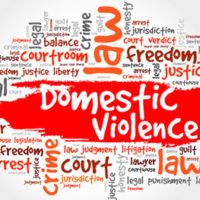Five Types of Domestic Violence in Virginia

Sometimes referred to as “family abuse” in the Commonwealth of Virginia, domestic violence is a broad term for certain criminal acts perpetrated against a family or household member. Virginia law includes both actual family members — such as parents, children, grandparents, etc. — and household members — such as roommates, romantic partners, and other people who live together.
As this type of family abuse centers on the relationship between the perpetrator and victim, there are many criminal offenses that can be considered domestic violence. The following sections will provide an overview of five offenses that can qualify as domestic violence in Virginia.
- Assault and Battery
Under Code of Virginia 18.2-57, it is unlawful to make physical contact with another person without their consent. This type of physical contact must be intentional. Accidental contact does not qualify as assault and battery.
In terms of domestic violence, Code of Virginia 18.2-57.2 provides special considerations for assault and battery offenses committed against a family or household member. There are heightened penalties for a domestic assault and battery.
- Stalking
Under Code of Virginia 18.2-60.3, it is unlawful to stalk, follow, or harass another person. If the perpetrator makes the victim fear for their life or safety, then it may qualify as stalking. This offense can also refer to threats of rape or sexual assault as well, if the victim reasonably believes that the stalker will carry out the act.
- Kidnapping
Under Code of Virginia 18.2-47, it is unlawful to abduct or detain another person against their will. If the perpetrator uses force, intimidation, or deception to detain the victim, then it qualifies as kidnapping. Virginia also enacted special considerations for a parent who violates a custody order. If that parent does not have a legal right to take their child at that time, then it can qualify as kidnapping.
- Sexual Assault
Under Code of Virginia 18.2-61, it is unlawful to have sexual relations with a person without their consent. If the perpetrator uses force, intimidation, or deception to achieve the act, then it qualifies as sexual assault. It does not matter if the perpetrator is married to the victim. So long as there is a lack of consent, it qualifies as sexual assault under Virginia law.
- Neglect
Under Code of Virginia 18.2-371.1, it is unlawful for a parent to neglect the basic needs of their children. In broad terms, parents have a duty to care for children and provide basic necessities, including but not limited to food, shelter, and clothing. The same duties apply to a parent or other caretaker in charge of an incapacitated adult, as detailed under Code of Virginia 18.2-369.
Do You Need Legal Help?
If you are facing charges for domestic violence in Virginia, it is extremely useful to seek out a skilled criminal defense attorney. The attorneys at Simms Showers LLP, servicing Leesburg, Winchester, Fairfax, and Manassas, have demonstrated capabilities defending clients against criminal charges in Virginia, including domestic violence. If you need legal help with criminal defense, contact us today for a free initial consultation.
Resource:
law.lis.virginia.gov/vacode/title18.2/chapter8/section18.2-371.1/
